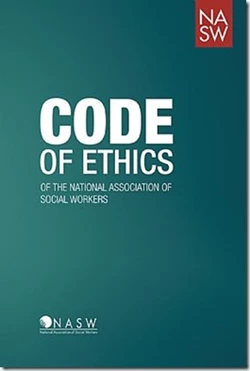 They're changing it again. The NASW Code of Ethics gets (or got, depending upon when you're reading this) an upgrade on June 1st, 2021. The Code will now include greater detail about self-care and cultural humility. Ethics expert Allan Barsky walks through the changes here (in print) and here (on the Social Work Podcast). From the print:
They're changing it again. The NASW Code of Ethics gets (or got, depending upon when you're reading this) an upgrade on June 1st, 2021. The Code will now include greater detail about self-care and cultural humility. Ethics expert Allan Barsky walks through the changes here (in print) and here (on the Social Work Podcast). From the print:
To address the lack of guidance on proactive self-care in the Code of Ethics, new language was added to the purpose and principles sections of the Code. No new standards were added, and no new revisions were made to existing standards. The first change in the purpose section is indicated by the bolded language below:
5. The Code socializes practitioners new to the field to social work's mission, values, ethical principles, and ethical standards, and encourages all social workers to engage in self-care, ongoing education, and other activities to ensure their commitment to those same core features of the profession.
So now taking care of yourself is good, ethical practice. Great! To hammer that home:
The following paragraph is a completely new addition to the purpose section of the Code.
Professional self-care is paramount for competent and ethical social work practice. Professional demands, challenging workplace climates, and exposure to trauma warrant that social workers maintain personal and professional health, safety, and integrity. Social work organizations, agencies, and educational institutions are encouraged to promote organizational policies, practices, and materials to support social workers' self-care.
Welcome aboard, self-care! Next up, some changes to 1.05, Cultural Competence. They're bolded:
(a) Social workers should demonstrate understanding of culture and its function in human behavior and society, recognizing the strengths that exist in all cultures.
(b) Social workers should demonstrate knowledge that guides practice with clients of various cultures and be able to demonstrate skills in the provision of culturally informed services that empower marginalized individuals and groups. Social workers must take action against oppression, racism, discrimination, and inequities, and acknowledge personal privilege.
(c) Social workers should demonstrate awareness and cultural humility by engaging in critical self-reflection (understanding their own bias and engaging in self-correction), recognizing clients as experts of their own culture, committing to lifelong learning, and holding institutions accountable for advancing cultural humility.
(d) Social workers should obtain education about and demonstrate understanding of the nature of social diversity and oppression with respect to race, ethnicity, national origin, color, sex, sexual orientation, gender identity or expression, age, marital status, political belief, religion, immigration status, and mental or physical ability.
(e) Social workers who provide electronic social work services should be aware of cultural and socioeconomic differences among clients' use of and access to electronic technology and seek to prevent such potential barriers. Social workers should assess cultural, environmental, economic, mental or physical ability, linguistic, and other issues that may affect the delivery or use of these services.
Social workers shouldn't just have an awareness of culture and its function, they should demonstrate that awareness. Give this another read: Social workers must take action against oppression, racism, discrimination, and inequities, and acknowledge personal privilege. Not might or should sort-of-must. If it wasn't already clear, taking action against inequity of all kinds is part of the job description.
Will these additions appear on the ASWB exam? Answer: Sort of. It takes a while for exam questions to get written, approved, tested, and accepted. But these changes are a primarily a strengthening of already-existing concepts in the Code. The call to social and political action was in there. Self-care was already good clinical practice.
So, as an exam-prepper, you needn't get worked up about the additions. But as an ethics-minded social worker, you have still more clarity about what it is you're supposed to be doing every day. It's a lot. Much respect!

 They're changing it again. The NASW Code of Ethics gets (or got, depending upon when you're reading this) an upgrade on June 1st, 2021. The Code will now include greater detail about self-care and cultural humility. Ethics expert Allan Barsky walks through the changes
They're changing it again. The NASW Code of Ethics gets (or got, depending upon when you're reading this) an upgrade on June 1st, 2021. The Code will now include greater detail about self-care and cultural humility. Ethics expert Allan Barsky walks through the changes